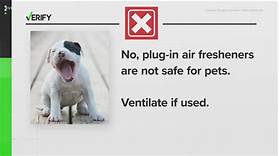Are Plug-In Air Fresheners Safe for Pets?
Plug-in air fresheners are a common household item used to eliminate odors and freshen the air. However, many pet owners are concerned about the safety of these products for their furry friends.

Ingredients in Plug-In Air Fresheners
Plug-in air fresheners contain a variety of chemicals, including:
1. Phthalates: These chemicals are used to make plastics soft and flexible. They have been linked to a number of health problems in humans, including respiratory problems, reproductive problems, and cancer.
2. Volatile organic compounds (VOCs): These chemicals are released into the air when the air freshener is heated. VOCs can cause respiratory problems, eye irritation, and headaches.
3. Fragrance allergens: These chemicals are responsible for the scent of the air freshener. They can cause allergic reactions in some people and pets.
Effects of Plug-In Air Fresheners on Pets
Studies have shown that plug-in air fresheners can have a number of negative effects on pets, including:
1. Respiratory problems: The chemicals in plug-in air fresheners can irritate the respiratory system of pets, causing coughing, wheezing, and difficulty breathing.
2. Eye irritation: The chemicals in plug-in air fresheners can also irritate the eyes of pets, causing redness, swelling, and tearing.
3. Skin irritation: The chemicals in plug-in air fresheners can irritate the skin of pets, causing itching, redness, and inflammation.
4. Behavioral changes: The chemicals in plug-in air fresheners can also affect the behavior of pets, making them anxious, aggressive, or withdrawn.
Tips for Keeping Pets Safe from Plug-In Air Fresheners
If you are concerned about the safety of plug-in air fresheners for your pets, there are a few things you can do to keep them safe:
1. Choose air fresheners that are pet-friendly: There are a number of pet-friendly air fresheners available on the market. These products are typically made with natural ingredients that are safe for pets.
2. Use air fresheners in moderation: Avoid using air fresheners in areas where your pets spend a lot of time. If you do use an air freshener, use it in a well-ventilated area.
3. Monitor your pets for signs of illness: If you notice any of the symptoms listed above in your pet, discontinue use of the air freshener and consult your veterinarian.
Declaration: All article resources on this website, unless otherwise specified or labeled, are collected from online resources. If the content on this website infringes on the legitimate rights and interests of the original author, you can contact this website to delete it.


